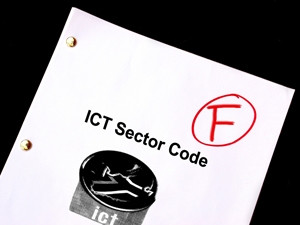
A year after the long-awaited ICT charter came into effect, it has been deemed a failure. It has not had any flow-through benefits, and the oversight body meant to ensure it is implemented and measure progress has yet to be set up.
The charter had several laudable aims, including the need to bridge the digital divide by promoting access to ICT, promoting the effective implementation of the Broad-Based Black Economic Empowerment Act, stimulating and supporting growth in the sector, supporting skills development, and advancing economic and social transformation in the sector.
It set targets that include unlisted companies being 30% empowered, and listed entities to sell 25.1% to black entities, with equity deals capped at R7.5 billion. The charter has also set a target of 10% of voting rights to be in the hands of black women.
The compliance target for enterprise development is 5% of after-tax profit, while socio-economic development contributions have a compliance target of 1.5% of after-tax profit. Although the requirements in terms of management control have been supplanted from the generic Codes of Good Practice, the targets for senior, middle and junior management - which excludes board level - have been increased.
Yet, two people who worked on putting it together say it has not achieved its aims, despite being in effect for just more than a year, and the root cause is there is no oversight mechanism and no forum that would allow companies to get together to achieve its aims.
No oversight
Adrian Schofield, a former steering committee member, says the charter has been a "big, fat fail". He adds there is no ICT council, for which nominations were requested towards the end of last year, which means there is no oversight body that ensures the charter is implemented. "It's another failure of the Department of Communications."

Schofield adds there is no mechanism that could measure progress, and no stick to make sure empowerment happens, and no applause is being given to companies that do transform. He says this also means there is no forum to allow those who want to achieve the charter's ideals - and not just pay lip service to it - can get together and move forward.
The communications department issued the final terms of reference for the council last October, and stated the nine-member council shall be appointed by communications minister Dina Pule, and it should submit annual reports.
The council was meant to oversee or monitor the implementation of the charter and compile reports on the status of broad-based empowerment in the sector. It was also meant to develop a practical manual, with examples, as well as implement an interactive portal to communicate the basic methods of applying the BEE scorecard.
Neither the Department of Trade and Industry nor the Department of Communications seem to be bothered to make sure the charter is implemented, so neither does anyone else, says Schofield. In addition, the empowerment framework does not encourage any new thinking and may have been relevant in a pen-and-paper era, but not in the electronic age, he notes.
A year down the line, unlisted companies should have sold at least 30% to empowerment groups and met other targets, such as a minimum level of black management, but the sector is not seeing the big deals and small companies are not reaping the benefits, says Schofield. "I don't know how we break out of it."
Schofield says the charter was not implemented when momentum was at its highest and when people were keen and, as time went by and there was no charter, the incentive to do something wore off.
Although companies had to comply with empowerment principles, agencies were happy to use the generic codes to supply ratings and everybody was happy that boxes were ticked, he notes.
Shuffling money
Andile Tlhoa'ele, former steering committee deputy chairman, notes that while companies are complying with the charter, this is simply a case of shifting money from one programme that they used to support to another in order to gain points.

Tlhoa'ele says, although changes should have already come through, the impact is low, the charter has not had the desired effect, and implementation cannot be monitored as there is no council. "Nothing has changed."
While companies are being rated by rating agencies, the issue with the charter is that they are just shifting resources, which means the impact is not being felt, says Tlhoa'ele. He adds that the industry-wide initiatives, such as e-learning, have not come into effect and no points can be earned for these because of the lack of a council.
In addition, as the generic codes are currently being amended, the charter may not be aligned because there is no council to draft any changes that may be needed, adds Tlhoa'ele.
Tlhoa'ele adds that, with hindsight, the charter should have focused on supporting the creation of enterprises that were technical in nature, and not those that provide support and services. He says it should have made sure SA was creating its own technical solutions, which is tied to skills development.
There are not many new technology ideas on the table, says Tlhoa'ele. "It hasn't worked...We haven't seen the impact of the charter yet."
Neither the Department of Trade and Industry, responsible for empowerment legislation, nor the Department of Communications responded to a request for comment.
Share